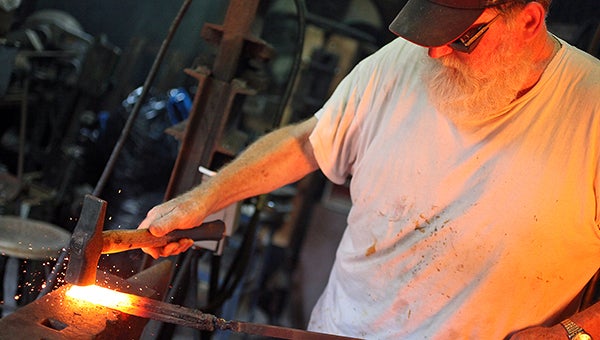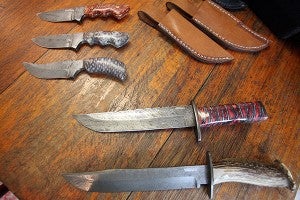Reviving a dying art
Published 10:06 am Monday, April 20, 2015

KNIFEMAKER: Blacksmith Bill Mangum hammers what will become one of his handmade knives on an anvil Thursday in his shop behind his home. (Justin Sellers/The Vicksburg Post)

Several of the knives made by blacksmith Bill Mangum are displayed Thursday on his kitchen table. Many of the knives Mangum makes have handles created from pine cones, magnolia pods, firewood, and other natural material found in Vicksburg. “I’ve never made two that look exactly the alike,” he said. (Justin Sellers/The Vicksburg Post)
It’s not even 70 degrees on a Thursday morning in mid-April, but inside a small shop behind Bill Mangum’s house off Culkin Road it’s stifling. Smoke fills the room, not quite billowing out through a small ventilation system fast enough to provide much comfort from the raging blaze burning in a coal-fire forge.
The 67-year-old Vicksburg native is a retired railroad worker turned blacksmith and spends most days — when he feels up to it — hand crafting Damascus steel knives in his shed.
“It’s not your everyday, run-of-the-mill hobby,” he said. “But to me it’s better than sitting in the house.”
A cascade of sparks shower the cramped space as Mangum brings his hammer down again and again on a piece of near-molten metal, shaping it and flattening it into what will become one of his signature blades. Clank, clank, clank, the hammer sounds as it smashes metal against glowing metal in a trade long forgotten by most.
“I got interested in doing traditional blacksmithing because it’s a dying art,” he said.
Mangum started blacksmithing in the early 2000s, about four or five years before retiring from a 33-year career with Kansas City Southern Railroad. In the early days he would work for hours on end in his shop; some days he would walk out from the “hot side,” as he calls it, with sweat sloshing in his shoes. But when he developed heart trouble several years ago he had to slow down and re-evaluate.
“Blacksmithing is hard work,” he said. “I didn’t want to give it up, so I got to reading about this Damascus steel and decided to give it a shot.”
Most knife makers are of the “shine and grind” variety, Mangum explained, meaning they simply buy a sheet of steel and make a knife out of it. On the flip side of that coin are those that take pride in forging their own steel, what’s called “heat and beat.”
“To me it’s just more authentic if you start from the raw material,” he said.
Mangum makes his particular blades from multiple layers of four different varieties of steel, which are forge-welded together at heats in excess of 2000 degrees, drawn to about 3/16” thickness, then cut in half. Those two halves are then stacked on top of each other, welded together again, and the process repeats until he has 512 layers of steel in the knife, he said. Once the piece of steel has the correct number of layers, he surface grinds it into the thickness he wants, cuts out the shape of the knife, grinds the blade and fits a handle to it.
When he was in good health and working in his shop everyday, a knife might take him 10 days from start to finish, he said. Now he gets out there when he can.
“I used to love doing it all the time when I was fully able to, but my old ticker won’t let me do it,” Mangum said.
Forge-welding knives isn’t something you can just pick up on your own, he said, so he had to learn the trade by talking to those that had done it before him. Those who were willing to share, that is.
“Some of them act like they’ve got secrets and don’t want to tell you anything, but a lot of them are willing to share their knowledge,” he said. “I don’t have any secrets. I show anybody anything that they want to know.”
Mangum hand-stitches his own sheaths and uses natural materials like pinecones, sweet gum balls and deer antlers for his handles. Much of the handle material he collects himself in Vicksburg and sends it off to be made into rectangular blocks that he can carve to his liking.
Many knives like his sell for thousands of dollars, but his typically run from $75-200, depending on the blade length and handle.
“If I paid thousands of dollars for a knife, I wouldn’t use it, but I tell everybody ‘I build these knives heat and treat them for people to use,” he said. “I want you to use them and come back and tell me how it did.”
Mangum will be out Saturday, along with about 150 other vendors, trying to find a home for his knives at the annual Old Court House Museum Flea Market. If you miss him there, his knives can be purchased by calling him at 601-636-8408.
The process of making the knives and the knowledge that he’s keeping a dying art alive are more important than making money, Mangum said, and he estimates he’s probably given away more knives than he’s sold.
“This is a hot job, but it’s an enjoyable job,” he said. “That’s the only way they had back in the old days.”





